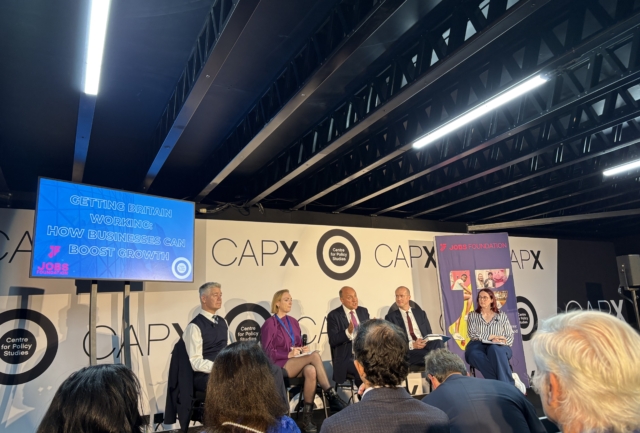Conservative Party Conference wrapped up in Manchester this week, and whilst the conference was definitely quieter than usual, the general atmosphere was far more jovial than the media may suggest. Senior Consultant Harriet Hill Harrison, who worked under three Conservative Economic Secretaries shares her take on the conference.
Attendance
The conference was notably quiet, with the most telling measure being how easy it was to get a seat and a drink in the Midland Hotel. Whilst the attendance of journalists, think-tankers and the political lobby seemed consistent with previous years, senior representation from UK businesses and the membership was noticeably low, as were corporate exhibitors, with multiple empty stands given over to ‘resting areas’. The average age at the conference also seems to have decreased considerably, with notably more young Conservatives in their early twenties than those of ‘middle age’. The younger crowd did however bring with them a buzz of excitement and a sense of optimism. The fringe events – particularly those featuring Shadow Ministers, industry leaders, conversations about the future of the party and free food, were generally better attended than some of the speeches in the main hall (most notably the Shadow Chancellor Mel Stride’s 10am address).
Atmosphere
The mood was more upbeat than might have been expected with members viewing the conference as an opportunity to catch up and chat about the direction of the party without the pressures of governing or of a pending leadership election. There of course was discussion of Reform UK, but with many viewing them as a temporary novelty and a product of where we are in the political cycle, rather than a long-term existential threat. Business Day once again was viewed by commercial attendees as a wasted investment with ‘bad catering and low attendance’, but most commercial delegates seemed to have a generally positive conference experience owing to smaller crowds and easier access to the Shadow frontbench.
Key policy announcements
Stronger Borders
- Creation of an ICE-style “Removals Force” to tackle illegal immigration.
- Plan to leave the European Convention on Human Rights (ECHR) to regain control over UK border policy.
- BORDERS plan to deport those who shouldn’t be in the UK and reduce small boat crossings.
Stronger Economy
- The Golden Economic Rule: Half of savings to go toward tax cuts, half toward deficit reduction.
- Abolition of Stamp Duty Land Tax on primary residences if the Conservatives win the next general election.
- £47 billion in public spending cuts, including:
- Downsizing the civil service
- Cutting excessive welfare spending
- Cutting overseas foreign aid
Justice & Crime
- Abolition of the Sentencing Council, giving ministers direct control over sentencing policy
- Hiring 10,000 new police officers
- Triple the rate of stop and search
- Stop non-crime hate incidents
More details on policy announcement s can be found here.
The future of the Conservative Party
Many of the remarks at the fringe events tried to bring focus back to traditional conservative values. Cultural cohesion, limited state intervention, free market capitalism, and limited taxation were recurring themes. There was talk about the previous Conservative government ‘not getting everything right’ and an acknowledgement that the party needed to rebuild trust and recognise their mistakes. Despite rumblings of Kemi Badenoch’s longevity as leader, and wannabe leaders Robert Jenrick and James Cleverly’s fringe events drawing in the crowds, there was a general consensus amongst members that Badenoch would stay the course – at least until after the May elections, where it is widely expected that Reform UK will make significant gains especially in Wales. Many however hold out hope that both Reform UK and Labour will fall short in their ability to govern, and the electorate will come back to the Conservative Party as the better devil they know. Kemi Badenoch’s speech today seemed to be received well by those who had remained in Manchester to see it, and for now the party seems to be rallying behind her. However, the real test will be the upcoming local, Scottish and Welsh elections, when her rivals may be waiting to swoop in on a promise of ‘resurrecting the party’.





